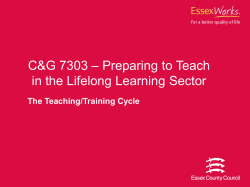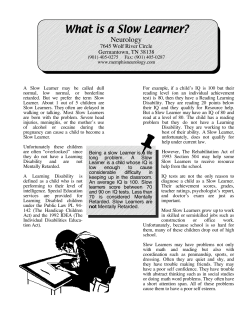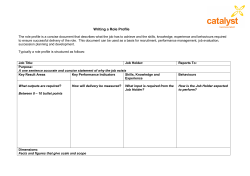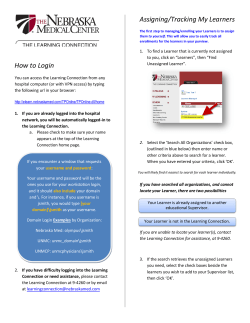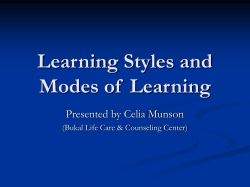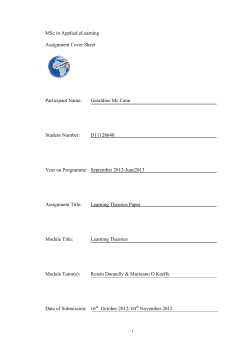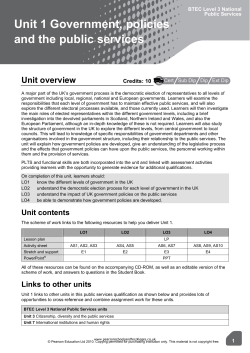
Table of Assessment methods, approaches and activities
Assessment methods, approaches and activities Method/approach/ activity Activities – group or individual Description Assignments Can be practical or theoretical tasks which can assess various aspects of a subject or qualification over a period of time Blended assessments Using more than one method of assessment, usually including technology Buzz groups Short topics to be discussed in small groups Case studies/ Scenarios Can be a hypothetical situation, a description of an actual event or an incomplete event, enabling learners to explore the situation Checklists A list of criteria which must be met to confirm competence or achievement Controlled Assessment An activity or test which occurs in a number of stages with varying levels of control to ensure reliability Usually timed Discussions with learners also known as a professional discussion Discussions/ debates e-assessments/ online assessments A one–to-one conversation between the assessor and learner based around the assessment criteria Different tasks carried out by learners to demonstrate their skills, knowledge, understanding and/or attitudes Learners talk about a relevant topic either in groups or pairs Essays Electronic assessment – assessment using information and communication technology (ICT) Synchronous – assessor and learner are simultaneously present, communicating in real time Asynchronous – assessor and learner are interacting at different times A formal piece of written text, produced by a learner, for a specific topic Examinations A formal activity which must be carried out in certain conditions Group work Enables learners to carry out a specific activity, for example, problem solving Can be practical or theoretical Enables learners to demonstrate several aspects of a programme or qualification at the same time Holistic Homework Activities carried out between sessions, for example, answering questions to check knowledge Interviews A one to one discussion, usually before a learner commences a programme, or part way through to discuss progress Learner statements Learners write how they have met the assessment criteria Learning journal/diary Learners keep a record of their progress, their reflections and thoughts, and reference these to the assessment criteria Watching learners perform a skill Observations A9051A (V2) - Copyright Ann Gravells - www.anngravells.co.uk Gravells A (2014) The Award in Education and Training (Revised) London Learning Matters SAGE Page 1 of 2 Peer assessments Learners give feedback to their peers after an activity Portfolios of evidence A formal record of evidence (manual or electronic) produced by learners towards a qualification Assesses a learner’s skills in action Practical activities/tasks Presentations Learners deliver a topic, often using information and communication technology Products Evidence produced by a learner to prove competence, for example, paintings, models, video, audio, photos, documents Projects A longer term activity enabling learners to provide evidence which meets the assessment criteria Puzzles, quizzes, word searches, crosswords etc Questions A fun way of assessing learning in an informal way Reports, research and dissertations A key technique for assessing understanding and stimulating thinking, can be informal or formal Questions can be closed, hypothetical, leading, open, probing, multiple choice Assessing what has previously been learnt, experienced and achieved to find a suitable starting point, or to claim equivalent or exemption units on the Qualifications and Credit Framework (QCF) Learners produce a document to inform, recommend and/or make suggestions based on the assessment criteria Role plays Learners act out a hypothetical situation Self assessment Simulation Learners decide how they have met the assessment criteria, or how they are progressing at a given time Designed to find out the level of skill or previous experience/knowledge towards a particular subject or vocation Imitation or acting out of an event or situation Team building exercises/energisers Tests A fun and light hearted way of re-energising learners after a break Can be used to informally assess skills, knowledge and attitudes A formal assessment situation Tutorials A one to one, or group discussion between the assessor and learner, with an agreed purpose, for example, assessing progress so far Video/Audio Recorded evidence of actual achievements Walk and talk A spoken and visual way of assessing a learner’s competence Witness statements/ testimonies A statement from a person who is familiar with the learner (they could also be an expert in the standards being assessed and the occupation of the learner in the work environment) Worksheets and gapped handouts Interactive handouts to check knowledge (can also be electronic) Blank spaces can be used for learners to fill in the missing words Recognition of prior learning (RPL) Skills tests A9051A (V2) - Copyright Ann Gravells - www.anngravells.co.uk Gravells A (2014) The Award in Education and Training (Revised) London Learning Matters SAGE Page 2 of 2
© Copyright 2025
